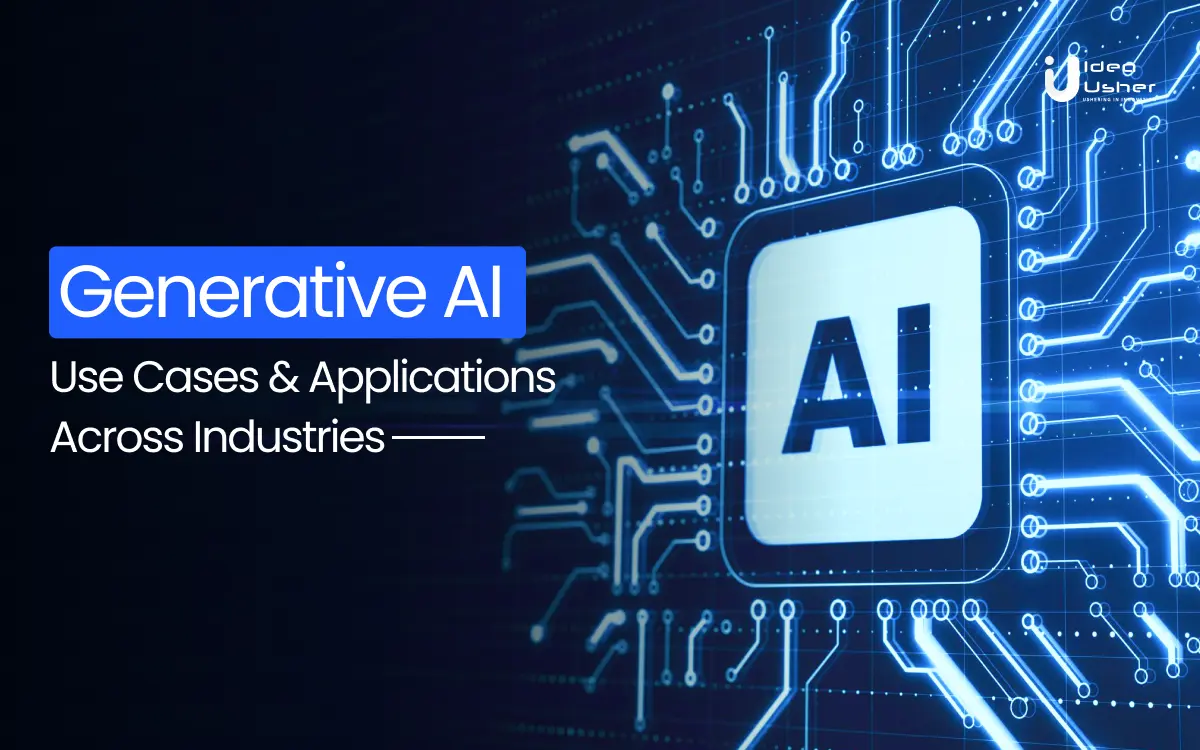
Generative AI (GenAI) is a powerful technology that utilizes deep learning algorithms to create entirely new content based on your prompt. It has the ability to automate manual processes like content creation, data analysis, customer service, product design, and a lot more. This AI technology has several use cases and applications that are transforming workflows across industries. It is doing everything from creating eye-catching marketing materials to analyzing complex scientific data. AI is building a new era of efficiency and creativity while pushing the boundaries of what’s possible.
This blog explores the use cases and application of Generative AI across various industries and highlights how businesses are using this technology to gain a competitive advantage. By the end of this blog, we’ll equip you with the knowledge to harness its power and propel your business toward future success.
What Is Generative AI?
Generative AI is an artificial intelligence innovation that offers a unique approach to data synthesis and content creation. Unlike traditional AI models that focus on prediction and classification, Generative AI utilizes machine learning to autonomously produce new content based on patterns extracted from vast datasets.
Basically, GenAI is an example of how efficiently machines interact with data. Their systems are trained to understand and replicate the underlying structure of the data, enabling them to generate text, images, code, and other forms of content in response to user prompts.
For example, if a GenAI model is trained with a variety of fiction writing, the model will learn to frame new stories and narrative elements with remarkable creativity and coherence. A real-world and most popular example of generative AI models is OpenAI’s ChatGPT.
The generative AI market is projected for explosive growth in the coming years. Having reached nearly USD 45 billion by the close of 2023, this sector has almost doubled in size compared to the previous year. This rapid expansion, exceeding USD 19 billion annually, is expected to maintain its momentum through the end of the current decade.
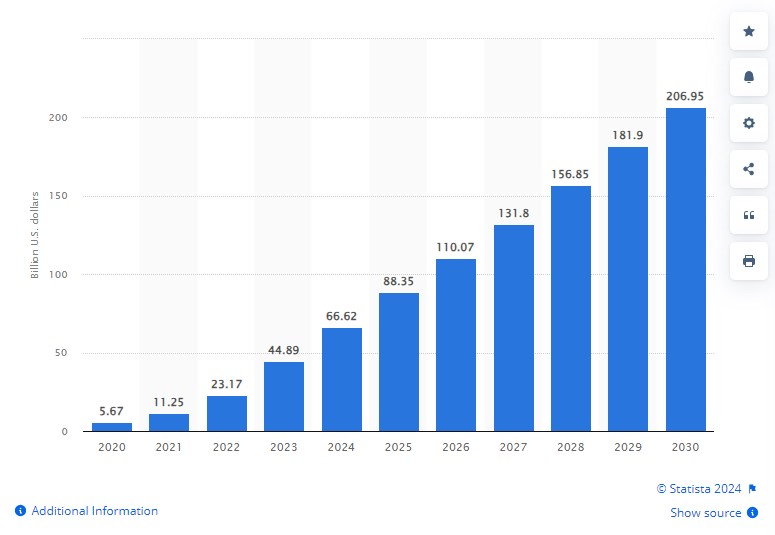
How Generative AI Creates New Content?
Generative AI uses deep learning models that are trained on massive datasets, like photo libraries, to generate entirely new content. There are two popular models: Generative Adversarial Networks (GANs) and Variational Autoencoders (VAEs).
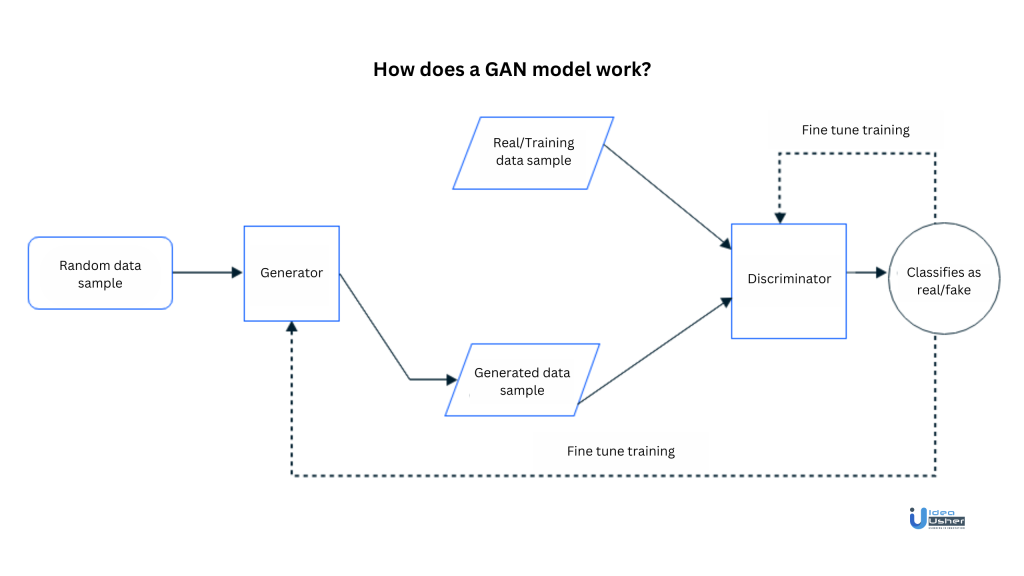
GANs pit two neural networks against each other. One of them is a generator that creates images, and another is a discriminator that tries to spot fakes. From this, the generator learns to produce realistic images, mimicking the training data.
On the other hand, VAEs work differently. They compress images into a hidden code and then learn to recreate them. This enables the model to generate new images by sampling from this hidden code while creating variations on the originals.
These techniques enable a range of applications, from generating realistic portraits to restoring blurry photos and even creating images based on text descriptions. It’s a revolutionary technology with exciting possibilities for the future.
The Potential Of Generative AI
Generative AI’s potential goes beyond mere content creation and presents groundbreaking solutions across industries:
1. Visual Content Generation:
Generative AI empowers users to effortlessly create and enhance visual content. From generating lifelike images based on textual prompts to enhancing existing images with advanced features, the possibilities are endless. Its key functionalities include –
- Image completion that includes filling in missing parts or fixing imperfections.
- Semantic image-to-photo translation for transforming sketches into photorealistic images.
- Image manipulation for altering styles, lighting, and colors while preserving original elements.
- Image super-resolution for enhancing image quality without losing details.
2. Audio Generation:
Generative AI can even facilitate music composition, text-to-speech generation, and speech-to-speech conversion with remarkable precision and realism. Its key applications encompass –
- Music creation by analyzing existing patterns and styles to generate fresh compositions.
- Text-to-speech generation for producing lifelike speech audio from written text.
- Speech-to-speech conversion for swift and seamless voiceover creation.
3. Text Generation:
Generative AI platforms like ChatGPT are already revolutionizing content creation and communication. With advanced natural language processing capabilities, they excel in generating, summarizing, and translating text with unparalleled accuracy. Here are some notable applications –
- Creative writing for crafting fiction, poetry, or engaging narratives.
- Conversational agents for developing virtual assistants and chatbots.
- Translation for seamlessly translating text across languages.
- Marketing and advertising content generation for compelling campaigns and promotional material.
4. Code Generation:
Generative AI streamlines coding processes by accelerating development cycles and improving code quality. Some of its notable capabilities include:
- Code completion for suggesting the next lines of code based on context.
- Code generation for converting textual prompts into functional code.
- Test case generation for assessing software functionality.
- Automated bug fixing for identifying and resolving code errors.
- Model integration for implementing machine learning models within software applications.
5. Collaboration and Enterprise Solutions:
Beyond content creation, Generative AI enhances collaboration and productivity within enterprises. From automating tedious tasks to facilitating knowledge management and synthetic data generation, its applications are diverse and impactful. Its key functionalities include –
- Automating meeting transcription and documentation with AI-powered tools like Microsoft Teams.
- Streamlining enterprise search for efficient information retrieval.
- Enhancing knowledge management by summarizing lengthy documents and generating insights.
- Generating synthetic data for various applications, including training and testing algorithms, while preserving privacy and data integrity.
Top 12 Use Cases And Applications Of Generative AI
Generative Artificial Intelligence (AI) is transforming industries with its ability to create, simulate, and innovate based on learned patterns. From entertainment, finance, healthcare, manufacturing, and beyond, the applications of generative AI are boundless and offer unparalleled insights and efficiencies. Here are some of the applications and use cases of Generative AI across the industries:
1. Hospitality:
In the hospitality sector, Generative AI improves guest experiences and operational efficiency. From customized guest interactions to predictive maintenance solutions, Generative AI empowers hotels and resorts to deliver exceptional service while optimizing resources and minimizing downtime. Here are a few applications and use cases of AI in hospitality:
- Customized Guest Experiences: Generative AI utilizes guest data to personalize suggestions, amenities, and services to enhance guest satisfaction and boost loyalty.
- Room Pricing Forecast: Generative AI predicts demand and optimizes room pricing dynamically while maximizing revenue and occupancy rates.
- Predictive Maintenance: By predicting maintenance needs, Generative AI ensures timely repairs and minimizes disruptions to guest services.
- Guest Feedback Analysis: Generative AI analyzes guest reviews and feedback and provides insights for service improvement and reputation management.
- Energy Consumption Optimization: Generative AI optimizes energy usage to reduce costs and environmental impact.
Real World Example:
- Hilton: They have developed AI-powered chatbots for guest communication and personalized hotel recommendations.
- Marriott: They are testing AI for dynamic hotel room pricing based on real time demand and market trends.
- Leading hotel brands, including Intercontinental Hotels Group and Wyndham Hotels & Resorts, are embracing AI technologies to enhance guest experiences and optimize operational processes.
- Giants in the online travel industry, such as Expedia, Kayak, Priceline, and Airbnb, are exploring the potential of generative AI to revolutionize the future of travel and accommodation.
2. Healthcare:
Generative AI technologies also contribute to healthcare practices by offering unprecedented advancements in diagnostics, personalized medicine, drug discovery, and patient care. Here are a few applications and use cases of AI in healthcare:
- Medical Diagnosis Image Synthesis: AI-driven algorithms help radiologists detect diseases and abnormalities in medical images such as X-rays, CT scans, and MRIs. It helps in enhancing diagnostic accuracy and patient outcomes.
- Natural Language Processing for Data Analysis: Generative AI algorithms analyze vast amounts of unstructured data within Electronic Health Records (EHRs) using Natural Language Processing (NLP) techniques and provide valuable insights for physicians and healthcare professionals.
- Personalized Medicine and Treatment Plans: Generative AI enables the development of treatment strategies based on individual patient data, optimizing treatment outcomes and minimizing adverse reactions.
- Enhanced Drug Discovery and Repurposing: AI-powered drug discovery platforms analyze large datasets to identify potential drug candidates and repurpose existing drugs for new therapeutic applications. It contributes to accelerating pharmaceutical research and development.
- Clinical Trial Optimization: Generative AI optimizes the planning and execution of clinical methods by identifying suitable patient cohorts and optimizing trial protocols. This expedites the drug development process and brings new treatments to market faster.
- Patient Engagement and Education: AI-driven applications create personalized patient education materials and improve health literacy so patients can make informed decisions.
- Operational Efficiency in Healthcare Facilities: Generative AI optimizes operational processes in healthcare facilities by analyzing data related to patient flow, resource utilization, and scheduling while improving efficiency and patient satisfaction.
- Telehealth and Remote Patient Monitoring: AI-powered telehealth solutions enable remote patient monitoring and real time health data analysis. It helps users with access to healthcare services and improving patient outcomes, particularly in remote or underserved areas.
Real World Example:
- Pfizer: Applies generative AI for drug discovery, accelerating the process of identifying potential new medicines.
- Mayo Clinic: They are trying to implement AI-powered systems to generate personalized treatment plans and analyze medical images.
- Pioneering startups like Ambience Healthcare, Nabla, and Abridge are leveraging generative AI to innovate healthcare solutions and improve patient outcomes.
- Innovative biopharmaceutical companies like Insilico Medicine and Evotec are utilizing generative AI algorithms to expedite the drug discovery and development process.
3. Entertainment:
In the entertainment industry, Generative AI is delivering versatile capabilities that influence various activities such as music composition, video production, gaming, and virtual reality experiences. Here are a few applications and use cases of AI in entertainment industry:
- Music Generation: Utilizing advanced algorithms, generative AI tools compose unique music tracks by analyzing intricate musical patterns and styles.
- Video Production and Editing: In video production, generative AI streamlines editing processes by incorporating special effects, generating animations, and even creating entire movies.
- Gaming Experiences: Within the gaming industry, generative AI contributes significantly by crafting dynamic characters, levels, and storylines that enhance user engagement and immersion in virtual worlds.
- Virtual Reality Development: Generative AI tools facilitate the creation of immersive environments, characters, and interactive elements for virtual reality experiences.
- Ready-Made Tools and Frameworks: Developers benefit from a plethora of ready-made tools and frameworks powered by generative AI. It accelerates game development and encourages innovation in the gaming ecosystem.
- Realistic Human-Like Voices: AI-driven tools enable the generation of lifelike voices for gaming avatars and animations that further enhance the authenticity and immersion of gaming experiences.
Real World Example:
- Netflix: They use generative AI to personalize thumbnails and video previews for individual users, maximizing engagement.
- Disney: They are implementing AI for character animation for theme parks and future films.
- Some of the major players in this market using Generative AI include Microsoft Corporation, Alphabet Inc., Nvidia Corporation, IBM Corporation, Autodesk Inc., Unity Software Inc., and Adobe Inc.
4. Manufacturing:
Generative AI transforms manufacturing processes by optimizing production efficiency, reducing costs, and enhancing product quality through predictive analytics, automation, and process optimization. Here are a few applications and use cases of AI in manufacturing:
- Predictive Maintenance and Downtime Reduction: AI-driven predictive maintenance systems analyze machine sensor data to anticipate equipment failures and plan maintenance activities proactively by minimizing downtime and optimizing equipment performance.
- Pattern Recognition for Enhanced Productivity: Generative AI algorithms identify patterns in production data to optimize manufacturing processes, improve efficiency, and reduce costs. It contributes to driving continuous improvement across the manufacturing value chain.
- Quality Improvement Through Defect Detection: AI-powered defect detection systems analyze sensor data to identify and address potential defects in products and ensure high product quality and customer satisfaction.
- Automation and Robotics Optimization: Generative AI optimizes robotics and automation systems by predicting optimal paths for robots and optimizing material handling processes. It improves overall efficiency and safety in manufacturing operations.
- Supply Chain Optimization: AI-driven supply chain optimization models analyze data to optimize inventory management, reduce lead times, and minimize costs while contributing towards seamless operations and timely delivery of products.
- Energy Consumption Optimization: Generative AI analyzes data to optimize energy consumption in manufacturing processes to reduce costs and environmental impact while maintaining production output.
- Fault Tolerance and Resilience: AI-powered fault tolerance systems analyze historical and real time data to predict and mitigate potential failures.
- Collaborative Robots (Cobots): Collaborative Robots (Cobots): Generative AI optimizes human-robot collaboration on the factory floor by determining efficient workflows, ensuring worker safety, and improving productivity and flexibility in manufacturing processes.
Real World Example
- Siemens: They have employed AI to design and optimize complex manufacturing processes, which has led to increased efficiency.
- Ford: They are experimenting with generative AI to create custom car designs based on user preferences and engineering constraints.
- Forward-thinking companies such as Autodesk and AWS Supply Chain are embracing generative AI technologies to optimize production processes, enhance product design, and streamline supply chain operations.
5. Finance And Banking:
In the finance and banking sector, generative AI technologies drive automation by enhancing decision-making and optimizing various processes, thereby revolutionizing traditional banking practices. Here are a few applications and use cases of AI in finance and banking:
- Real Time Fraud Detection: Generative AI algorithms analyze vast amounts of transaction data in real time to detect patterns and anomalies that are indicative of fraudulent activities.
- Personalized Banking Experiences: By leveraging customer data, generative AI enhances customer interactions by offering personalized financial advice, product recommendations, and tailored services, fostering customer engagement and loyalty.
- Credit Scoring: Generative AI analyzes diverse data points such as income, employment history, and credit records to predict the creditworthiness of individuals and entities, revolutionizing the credit scoring process.
- Risk Management and Fraud Detection: AI-driven risk management systems analyze historical data to identify patterns and trends, enabling proactive risk mitigation strategies and fraud detection measures.
- Robotic Process Automation: Generative AI automates repetitive tasks such as data entry and compliance checks, improving operational efficiency and reducing human errors in banking operations.
- Portfolio Management: By analyzing market data and investment trends, generative AI assists in optimizing investment portfolios, maximizing returns, and minimizing risks for investors and financial institutions alike.
- Trading Strategies: Generative AI algorithms generate and execute trading strategies based on market conditions and historical data, enabling informed investment decisions and maximizing trading efficiency.
- Pricing Optimization: AI-powered pricing optimization models analyze market dynamics and consumer behavior to optimize pricing strategies for financial products, ensuring competitiveness and profitability in a dynamic market environment.
Real World Example:
- JPMorgan Chase: They are utilizing AI to generate personalized financial reports and investment recommendations for clients.
- BlackRock: They are exploring AI for generating custom risk management models and analyzing market trends.
- Leading technology giants, including Google Cloud, Microsoft, AWS, Alibaba Cloud, IBM, SAP, Salesforce, and C3.ai are driving the finance sector through the adoption of AI technologies.
- Prominent financial institutions such as Bloomberg and Morgan Stanley, among others, are harnessing the power of Generative AI to conduct financial research, enhance client communication, and improve customer support services.
6. Private Equity:
For private equity, Generative AI serves as a strategic ally and provides decision-makers with invaluable insights for investment analysis and portfolio optimization. By automating due diligence processes and predicting market trends, it enables private equity firms to make informed decisions and maximize returns.
- Investment Analysis: Generative AI assists in analyzing potential investment opportunities by leveraging historical financial data and market insights. It generates predictive models for risk assessment and return estimation.
- Portfolio Optimization: Through dynamic asset allocation based on market conditions, Generative AI optimizes portfolio management and mitigates risks while maximizing returns.
- Due Diligence Automation: Generative AI streamlines due diligence processes by automating the analysis of legal documents and financial statements while expediting decision-making and risk assessment.
- Market Sentiment Analysis: By analyzing social media and news data, Generative AI provides insights into market sentiment. It helps in making investment decisions and risk management.
- Competitor Analysis: Generative AI analyzes competitors’ strategies and performance and identifies opportunities for differentiation and growth.
Real World Example:
- KKR: They are exploring AI to identify potential investment opportunities and analyze company financials.
- The Carlyle Group: They are testing AI to generate due diligence reports and uncover hidden risks in potential acquisitions.
7. Real Estate:
Generative AI applications are changing how the real estate sector operates by optimizing property valuation, personalized property search, pricing optimization, and virtual property visualization. Here are a few applications and use cases of AI in real-estate industry:
- Property Valuation: AI-driven algorithms predict property values based on factors such as location, size, and condition, providing valuable insights for real estate agents and investors.
- Property Search: Generative AI generates personalized property recommendations based on individual preferences and search history, streamlining the property search process for buyers and renters.
- Pricing Optimization: AI-powered pricing optimization models analyze market trends and demand dynamics to optimize property pricing strategies, maximizing returns for sellers and landlords.
- Predictive Maintenance: Generative AI predicts maintenance needs for real estate properties, ensuring timely repairs and minimizing disruptions for tenants and property owners.
- Floor Plan Generation: AI-driven tools generate interactive floor plans and 3D visualizations of properties, enhancing property marketing and visualization for buyers and tenants.
- Virtual Property Tours: Generative AI creates immersive virtual tours of properties, enabling remote viewing and enhancing the property showcasing experience for buyers and renters.
- Investment Analysis: AI-powered investment analysis tools analyze market data and property performance metrics to identify lucrative investment opportunities and optimize investment portfolios.
- Property Management Automation: Generative AI automates routine property management tasks such as maintenance scheduling, rent collection, and tenant communication, improving operational efficiency for property managers and landlords.
Real World Example:
- Zillow: Using AI to generate virtual tours and realistic property images, enhancing online listings.
- Compass: Implementing AI for property valuation and market analysis, providing valuable insights to clients.
8. Retail and E-commerce:
Generative AI transforms the retail industry with personalized shopping experiences and optimized operations. From dynamic pricing strategies to visual search capabilities, Generative AI empowers retailers to stay competitive, drive sales, and build customer loyalty in the digital age. Here are a few applications and use cases of AI in retail and e-commerce:
- Personalized Shopping Experience: Generative AI analyzes customer behavior to provide personalized product recommendations, enhance customer engagement, and drive sales.
- Demand Forecasting: By predicting demand fluctuations, Generative AI optimizes inventory management to reduce stockouts and minimize overstock situations.
- Dynamic Pricing Strategies: Generative AI algorithms adjust product prices dynamically based on customer behavior and market trends to maximize revenue and competitiveness.
- Customer Segmentation: Generative AI identifies distinct customer segments and allows retailers to customize marketing strategies and product offerings accordingly.
- Visual Search and Recommendation: Generative AI enables features like visual search while enhancing the customer shopping experience with accurate product suggestions.
Real World Example
- Amazon: Utilizes AI for product recommendations and personalized marketing campaigns while driving higher conversion rates.
- Sephora: Offers AI-powered virtual try-on experiences for makeup and cosmetics and enhances customer engagement.
- Shopify: Utilizes Generative AI to deliver personalized shopping experiences and streamline operational workflows, thereby saving time and increasing efficiency.
9. Education:
Generative AI revolutionizes education by personalizing learning experiences and automating administrative tasks. From adaptive learning content to virtual laboratories, Generative AI empowers educators to cater to individual student needs and enhance learning outcomes. Here are a few applications and use cases of AI in education sector:
- Personalized Learning Content: Generative AI customizes educational content to individual learning styles, adapting materials and exercises to suit each student’s needs.
- Automated Grading and Feedback: Generative AI automates grading processes and provides instant feedback to students while enabling educators to focus on teaching.
- Intelligent Tutoring Systems: Generative AI powers tutoring systems that offer personalized guidance and adapt teaching methods based on student performance and progress.
- Virtual Laboratories and Simulations: Generative AI creates virtual labs and simulations. It offers students realistic and interactive learning experiences in subjects like science and engineering.
- Adaptive Assessments: Generative AI designs adaptive assessments that adjust difficulty based on student performance to provide an accurate evaluation of knowledge and skills.
Real World Example
- Duolingo: They use AI for personalized language learning while adapting the curriculum to individual student progress.
- McGraw-Hill: They have developed AI-powered tutoring systems that provide students with on-demand academic support.
10. Automotive:
Generative AI drives innovation in the automotive industry by optimizing vehicle design, performance, and supply chain logistics. From design optimization to predictive maintenance, Generative AI enables automakers to deliver safer and more efficient vehicles while staying ahead of market trends. Here are a few applications and use cases of AI in automotive:
- Design Optimization: Generative AI enhances vehicle designs and components to ensure performance and safety standards are met while accelerating the design process.
- Vehicle Performance Simulation: Generative AI simulates driving conditions to enable engineers to assess and enhance vehicle performance, fuel efficiency, and safety features.
- Predictive Maintenance: By analyzing sensor data, Generative AI predicts potential issues and maintenance needs, minimizes downtime, and improves vehicle reliability.
- Supply Chain Optimization: Generative AI optimizes the automotive supply chain while reducing lead times and enhancing overall supply chain resilience.
- Driver Assistance Systems: Generative AI contributes to Advanced Driver Assistance Systems (ADAS) development to improve vehicle safety through features like lane departure warnings and collision avoidance.
Real World Example:
- Tesla: Tesla is employing AI for self-driving car technology with a focus on generating safe and efficient navigation.
- General Motors: They are using AI to design and engineer next-generation car models to optimize performance and fuel efficiency.
- Major automotive companies like Mercedes-Benz, Toyota, CarMax, and BMW are leveraging generative AI to drive innovation in vehicle design, manufacturing processes, and customer experiences.
11. Fashion:
In the fashion industry, Generative AI boosts creativity and sustainability. From creative design assistance to virtual try-ons, this technology enables fashion brands to create unique experiences for customers while reducing waste and promoting eco-friendly practices. Here are a few applications and use cases of AI in fashion industry:
- Creative Design Assistance: Generative AI assists designers by generating innovative design concepts by analyzing historical trends, consumer preferences, and current fashion data.
- Personalized Shopping Experiences: By analyzing customer preferences and market trends, Generative AI provides personalized product recommendations and improves the shopping experience.
- Sustainable Design Solutions: Generative AI facilitates sustainable fashion design by optimizing material choices and production processes and promotes environmental sustainability.
- Virtual Try-ons and Fittings: Generative AI enables virtual try-ons through augmented reality and allows customers to visualize clothing items before purchase. It reduces return rates and improves overall online shopping experiences.
Real World Example:
- Zara: They are working around with AI to generate custom fashion designs based on current trends and customer preferences.
- Nike: Nike uses AI to design and manufacture performance apparel while optimizing comfort and functionality for athletes.
12. Legal Business Innovation:
Generative AI disrupts traditional legal practices by automating document analysis, predicting case outcomes, and streamlining compliance monitoring. With its ability to expedite legal processes and provide actionable insights, Generative AI enables legal professionals to deliver effective services to clients.
- Legal Document Analysis: Generative AI expedites document management processes by reviewing and analyzing legal documents, contracts, and case law, improving efficiency and accuracy.
- Predictive Legal Analytics: By processing vast amounts of legal data, Generative AI predicts case outcomes, assists in legal strategy formulation, and provides insights into potential risks and opportunities.
- Contract Generation: Generative AI automates the generation of standard legal contracts while saving time and reducing errors in document drafting.
- Compliance Monitoring: Generative AI continuously monitors regulatory changes and provides real time updates to legal professionals while ensuring compliance with evolving legal frameworks.
- Litigation Outcome Prediction: By analyzing historical case data, Generative AI predicts potential litigation outcomes. It helps legal teams with risk assessment and decision-making.
Real World Example:
- Dentons: They are experimenting with AI to generate legal documents and contracts to streamline lawyers’ workflows.
- Baker McKenzie: They are using AI-powered legal research tools to analyze legal data and identify relevant case precedents.
- Gunderson Dettmer: They have unveiled proprietary tools that utilize generative AI to assist in active client matters, demonstrating a commitment to innovation and excellence in legal services.
How Can You Maximize AI’s Impact In Your Business?
As experts in app development, we’re here to guide you through the process of implementing AI for maximum impact across your industry.
1. Clarify Objectives:
We will start by defining clear objectives and goals for AI implementation customized to your business needs. Together, we’ll identify specific challenges or opportunities where AI can drive value and strategic growth.
2. Data Collection:
Our team will assist you in gathering relevant and high-quality data from diverse sources. We’ll ensure that the data collected is comprehensive and representative of real-world scenarios. This will lay a solid foundation for robust model training and validation.
3. Data Preprocessing:
We’ll carefully cleanse, normalize, and preprocess your data to eliminate noise and inconsistencies. By preparing your data effectively, we’ll enhance the performance and accuracy of AI models that will deliver actionable insights for informed decision-making.
4. Feature Engineering:
Our experts will identify and select informative features to train AI models effectively. Through advanced feature engineering techniques, we’ll extract valuable insights from your data while maximizing the predictive power of AI.
5. Algorithm Selection:
Drawing on our deep expertise in AI, we’ll recommend suitable algorithms customized to your business objectives and data characteristics. From machine learning to deep learning models, we’ll identify the optimal solution for your unique use case.
6. Model Training:
Our team will train and fine-tune AI models using state-of-the-art techniques. Through iterative experimentation and validation, we’ll optimize model performance to meet your business requirements.
7. Validation And Testing:
Rigorous validation and testing ensure the reliability and generalization capabilities of AI models. We’ll evaluate model performance using separate validation datasets and conduct comprehensive testing on unseen data.
8. Deployment:
Once the AI models are trained and validated, we’ll seamlessly deploy them into your production environment. Our goal is to ensure smooth integration with your existing systems and workflows while minimizing disruption to your operations.
9. Continuous Monitoring And Improvement:
With our robust monitoring mechanisms in place, we’ll track the performance of deployed AI solutions in real time. By collecting feedback and data, we’ll iteratively refine models to enhance system capabilities over time.
10. Ethical Considerations:
Your trust and ethical principles are important to us. Thereby, we’ll prioritize ethical considerations that will address potential biases and privacy concerns associated with AI deployment while implementing safeguards for responsible use.
11. User Training And Acceptance:
Our comprehensive training programs will empower your team to effectively utilize AI systems. We’ll provide ongoing support to promote user acceptance and engagement while ensuring a seamless transition to AI-powered solutions.
12. Documentation:
Transparent documentation of the AI implementation process is crucial for future reference and troubleshooting. We’ll maintain detailed records of data sources, preprocessing steps, model architectures, and deployment procedures.
13. Scale And Optimization:
As your business grows, we’ll scale AI solutions to handle larger datasets and expand their applications. Our focus will be on optimizing systems for efficiency, performance, and scalability to drive sustained success.
14. Feedback Loop:
In our approach, continuous improvement is integral. We’ll establish a feedback loop to gather insights and refine AI solutions based on user feedback and evolving business needs, driving innovation and excellence forward.
Top 5 Generative AI Model In 2024
1. ChatGPT
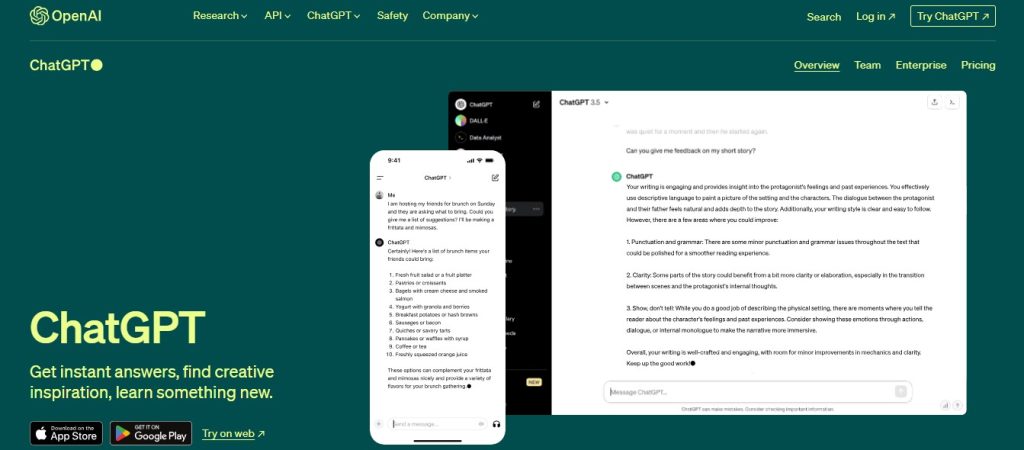
ChatGPT is a language model developed by OpenAI to engage in natural and seamless conversations. Its capabilities extend to answering follow-up queries, admitting errors, challenging flawed assumptions, and tactfully declining inappropriate requests.
- Launch Date: November 30, 2022
- Head Office Location: San Francisco, California, USA
2. Gemini
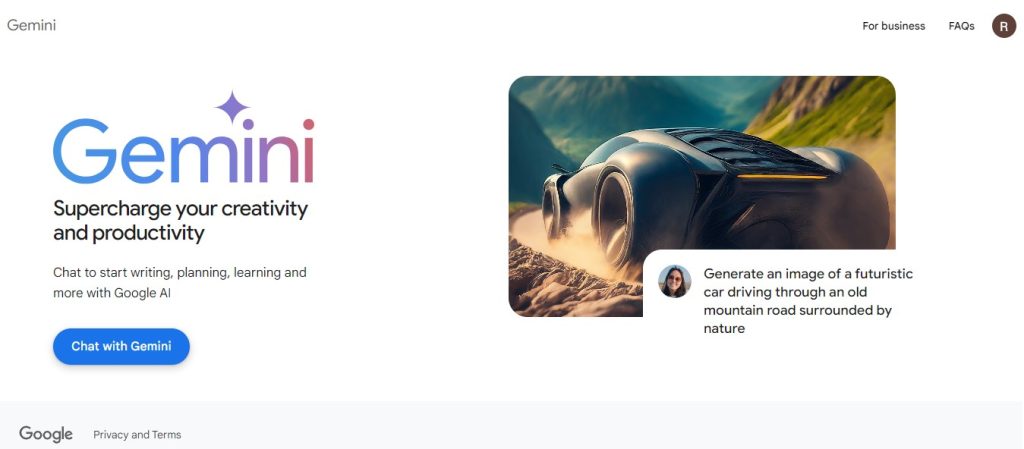
Gemini is a collaborative effort between Google’s DeepMind and Google Research that represents a groundbreaking advancement in AI. These large language models demonstrate unparalleled prowess in seamlessly reasoning across various mediums, including text, images, audio, video, and code.
- Launch Date: Not specified
- Head Office Location: Mountain View, California, USA
3. DALL-E
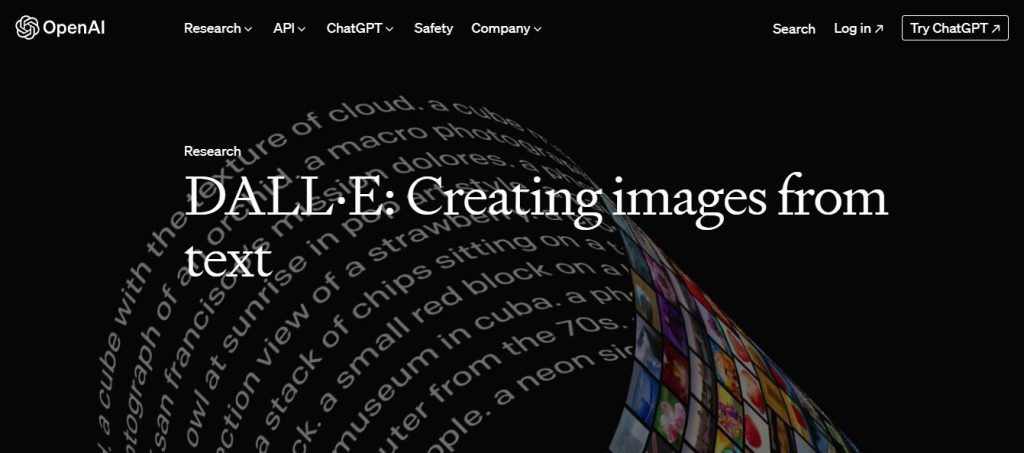
DALL-E is also a product of OpenAI that redefines the boundaries of generative AI. With its ability to generate visual imagery from textual descriptions, DALL-E excels in producing anthropomorphized versions of animals and objects by merging disparate concepts and applying imaginative transformations to existing images.
- Launch Date: January 2021 (DALL-E), October 2023 (DALL-E 3)
- Head Office Location: San Francisco, California, USA
4. Midjourney

This is an independent research lab that is on a quest to explore new frontiers of thought. With a keen emphasis on design, human structure, and AI, Midjourney aims to boost human creativity and expand the horizons of innovation.
- Launch Date: 2022
- Head Office Location: San Francisco, California, USA
5. Sora AI
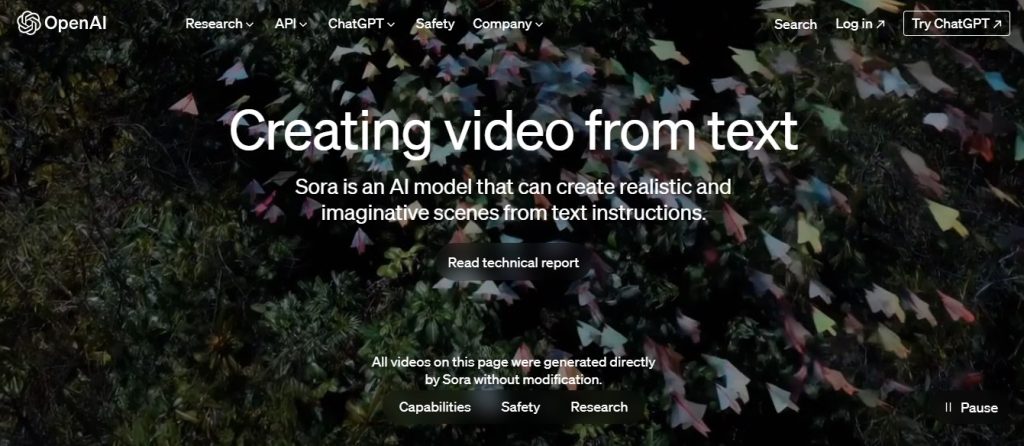
Sora AI is a new GenAI model developed by OpenAI. This innovative tool focuses on creating short videos from text descriptions. Using Sora AI, users can describe a scene, characters, and actions, and Sora will translate that into a video featuring realistic visuals and even complex camera movements. This makes Sora AI a valuable tool for anyone who wants to create video content that can range from marketing materials to explainer videos.
- Launch Date: 2024
- Head Office Location: San Francisco, California, USA
Conclusion
Generative AI is rapidly transforming how businesses operate and innovate. These powerful models, like ChatGPT, Gemini, DALL-E, Midjourney, and Sora AI, are pushing the boundaries of content creation and problem-solving across various industries. These GenAI models are streamlining daily tasks and even accelerating scientific discoveries through AI-driven simulations. The future of Generative AI holds immense potential, and you can unlock a wealth of opportunities to enhance efficiency, drive growth, and contribute to advancements in diverse fields.
How Can Idea Usher Help?
At Idea Usher, we recognize the potential of AI for businesses. Our team of AI experts excels in developing customized solutions like ChatGPT and SoraAI that can address your unique business challenges. We specialize in creating AI models that streamline operations, improve customer experiences, and provide data-driven insights to drive innovation. With a track record of delivering impactful projects, we are here to help you explore the endless possibilities AI holds for your business. Connect with us today!
FAQ
What are the applications or use cases of AI?
An example of an AI applications or use cases is virtual assistants like Siri or Alexa, which use natural language processing to understand and respond to user commands, enhancing user convenience. These assistants exemplify how AI technology integrates into daily life, aiding tasks such as setting reminders and controlling smart devices.
What is the real use cases of AI?
Real-world AI applications and its use cases span various industries, such as healthcare, where AI-powered diagnostic systems assist medical professionals in analyzing medical images and making accurate diagnoses.
Which application is used for AI?
Commonly used AI applications include machine learning, which enables computers to learn from data. Machine learning algorithms power recommendation systems on platforms like Netflix and Amazon, enhancing user satisfaction.
What are 10 ways AI is used today?
AI is utilized in various ways today, and these applications and use cases highlight the impact and versatility of AI across sectors:
- NLP: Facilitates language translation, sentiment analysis, and chatbot interactions.
- Computer Vision: Powers image recognition, object detection, and facial recognition.
- Recommendation Systems: Generates personalized recommendations in streaming and e-commerce.
- Predictive Analytics: Forecasts trends in finance, marketing, and healthcare.
- Autonomous Vehicles: Enables safe navigation without human intervention.
- Healthcare Diagnostics: Assists in accurate diagnosis and personalized medicine.
- Virtual Assistants: Respond to voice commands and perform tasks.
- Fraud Detection: Identifies fraudulent activities in financial transactions.
- RPA: Automates repetitive tasks in manufacturing and customer service.
- Language Generation: Creates human-like text for content creation and storytelling.










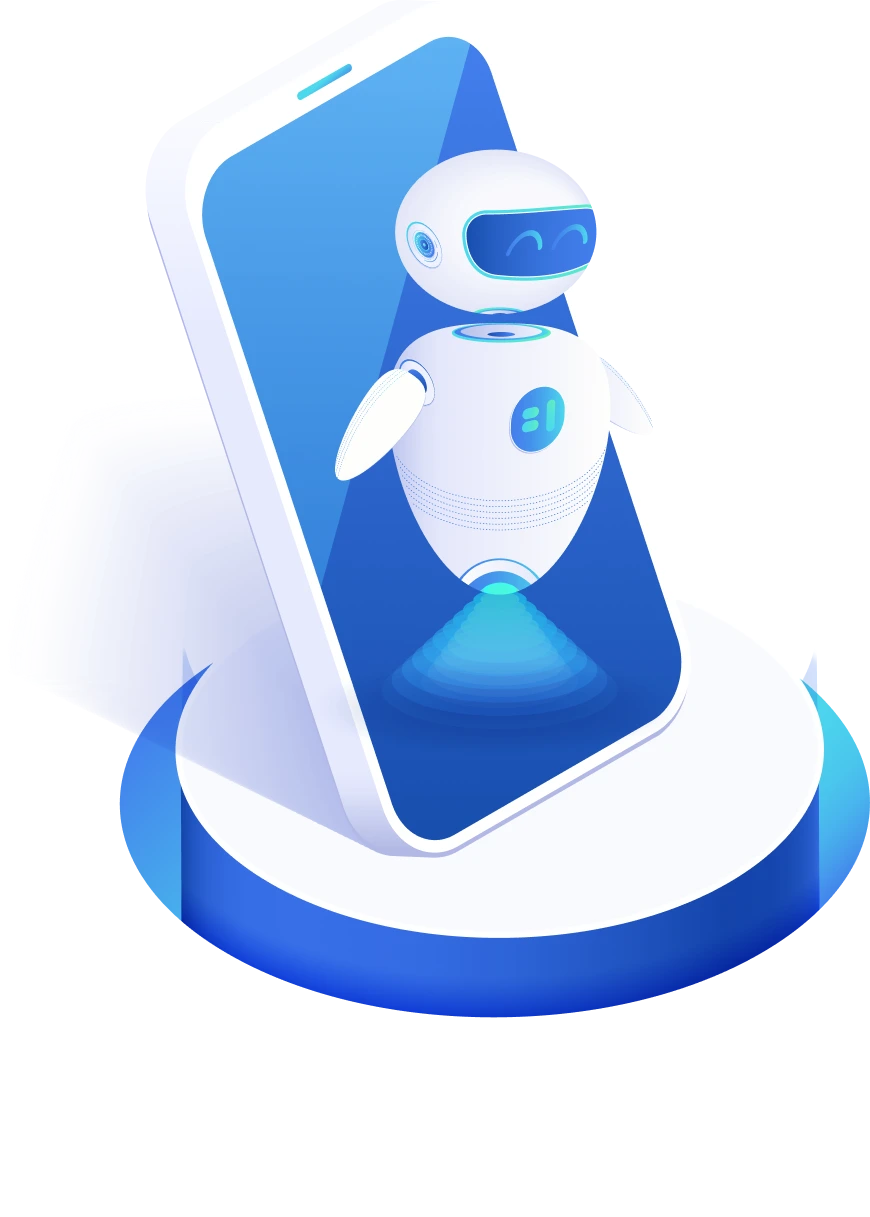


Rebecca Lal